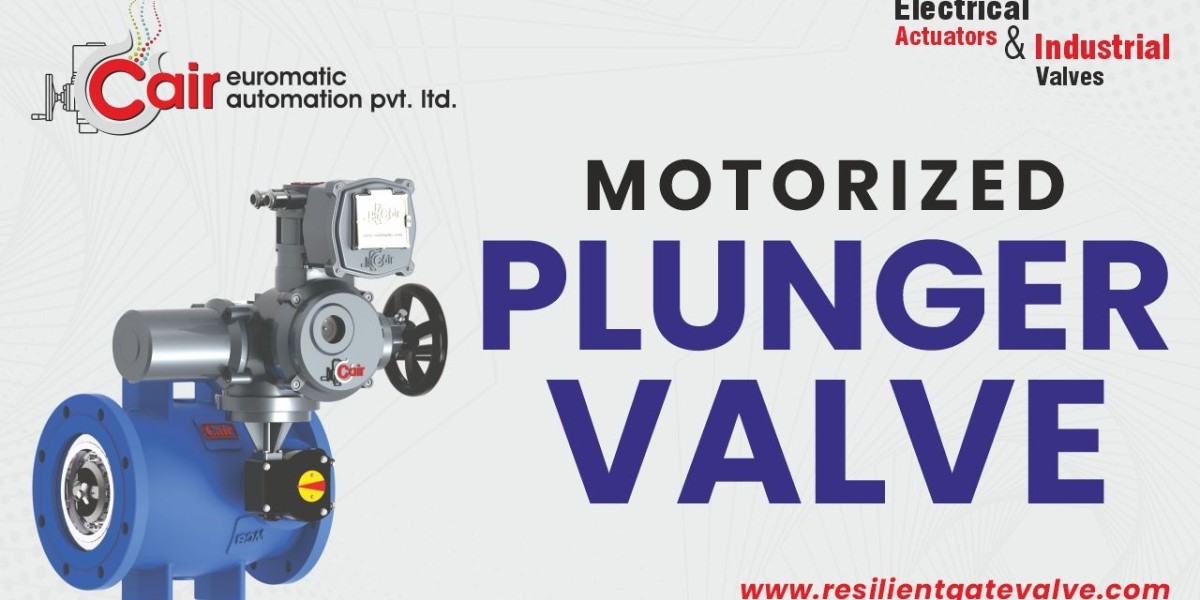In fluid control systems—especially those involving water supply, wastewater treatment, and industrial processing—precision and durability matter. That’s where plunger valves come into play. These valves are known for their ability to control flow and pressure with accuracy and consistency. Whether you're managing water levels in a dam or regulating flow in an industrial plant, plunger valves offer unmatched performance.
In this article, we’ll explore what a plunger valve is, how it works, its key features, and where it's commonly used.
✅ What Is a Plunger Valve?
A plunger valve is a type of control valve designed to regulate the flow rate and pressure of liquids, particularly in pipelines that operate under high or fluctuating pressure conditions. It consists of a plunger or piston that moves axially within the valve body to either restrict or allow flow.
Unlike other valves, such as gate or ball valves that primarily work in open or closed positions, plunger valves can fine-tkune the flow, making them ideal for pressure-reducing and modulation applications.
? How Does a Plunger Valve Work?
The working principle of a plunger valve is quite straightforward yet highly effective:
Inside the valve body is a plunger or piston connected to an actuator (manual, electric, or hydraulic).
When the actuator moves the plunger, it either opens or restricts the flow area.
This movement allows the valve to control flow rate or reduce pressure as required by the system.
Unlike many other valve types, a plunger valve offers linear flow characteristics, meaning you get predictable and smooth changes in flow as the valve operates.
? Key Features of a Plunger Valve
Plunger valves are widely appreciated for their technical advantages. Some of the core features include:
1. Accurate Pressure Control
Plunger valves can handle precise flow and pressure adjustments, which is essential in water networks, industrial lines, and pump stations.
2. Minimal Water Hammer
Thanks to their controlled closing mechanism, they help reduce water hammer, a common issue in fast-closing valve types.
3. Corrosion Resistance
Plunger valves are often manufactured using high-grade stainless steel, ductile iron, or bronze, with rubber lining or epoxy coating to resist corrosion in aggressive environments.
4. Versatile Operation
They can be operated manually, or automated with electric, pneumatic, or hydraulic actuators, making them suitable for a variety of setups.
5. Low Maintenance
Because of fewer moving parts and high durability, plunger valves offer long service life and require minimal maintenance compared to more complex valve systems.
? Industrial Uses of Plunger Valves
Plunger valves are versatile and can be found in several industries, particularly where precise control of flow or pressure is required:
✔️ Water Supply and Distribution
Used to control flow into city pipelines, water towers, and rural networks—especially where pressure must be reduced without sudden drops.
✔️ Hydropower Stations
Used to manage turbine inflow, allowing controlled energy generation from high-pressure water.
✔️ Wastewater Treatment
In treatment plants, plunger valves are used to modulate the flow of effluent, ensuring consistent treatment efficiency.
✔️ Pumping Stations
Installed at pump outlets to prevent pressure surges and to maintain flow stability.
✔️ Irrigation Systems
Ideal for controlling water flow in large-scale agricultural irrigation pipelines.
?️ Why Choose Plunger Valves Over Other Types?
While other valves like resilient seated sluice valves, non-return valves, or butterfly valves have their roles, plunger valves are uniquely equipped for scenarios where:
You need precise pressure regulation
You require gradual valve movement
You are dealing with high-pressure systems
Water hammer prevention is a priority
Their modular design and high compatibility with other valve types make them an excellent addition to any industrial fluid control system.
? Plunger Valve Suppliers in India – Who to Trust?
India is home to many trusted valve manufacturers, and one notable name is resilientgatevalve—a leading producer and exporter of industrial valves.
As a reliable Resilient Seated Sluice Valve Manufacturer, we offer a full portfolio that includes:
Metal Seated Sluice Valves
Air Valves Single and Double
Non Return Valves
Pressure Reducing Valves
Plunger Valves
We ensure all products meet international standards and are suitable for municipal, industrial, and agricultural applications. Our valves are tested for strength, performance, and corrosion resistance before reaching your site.
? Final Thoughts
Plunger valves may not be as well-known as gate or butterfly valves, but their role is critical in precision flow and pressure management. They offer excellent reliability, long service life, and efficient system performance. Whether you’re designing a new water distribution network or upgrading your existing infrastructure, plunger valves can deliver safe, smooth, and efficient operation.
If you’re in search of plunger valves from a trusted supplier in India, look no further than resilientgatevalve. With decades of experience and a customer-first approach, we deliver solutions that last.
? Contact Us
resilientgatevalve – Trusted Industrial Valve Manufacturer
? Website: resilientgatevalve
? Email: resilientgatevalve@gmail.com
? Call: +91-9825658634


